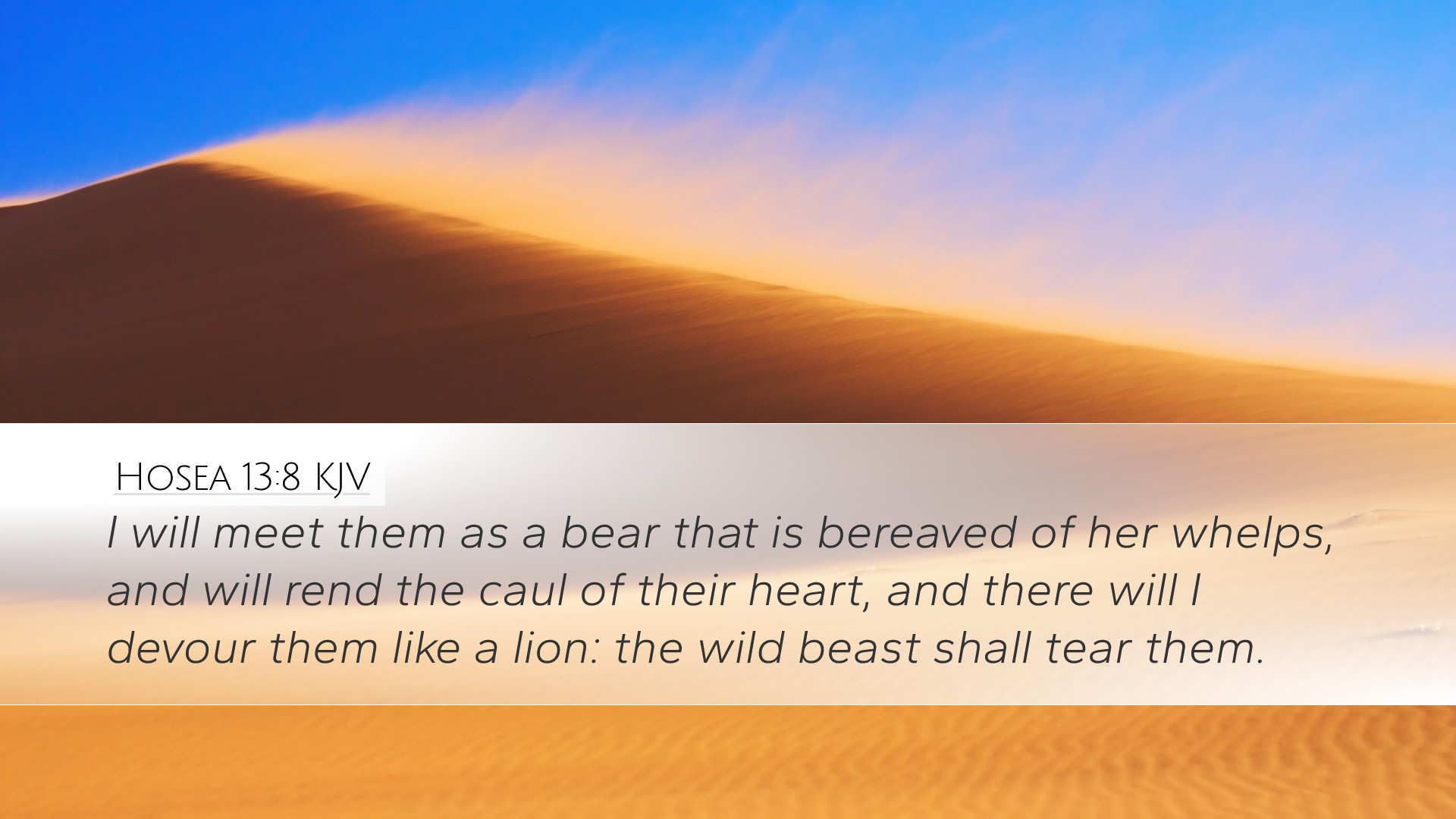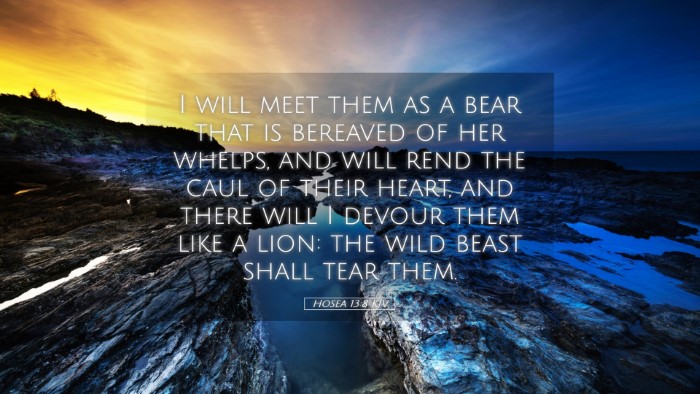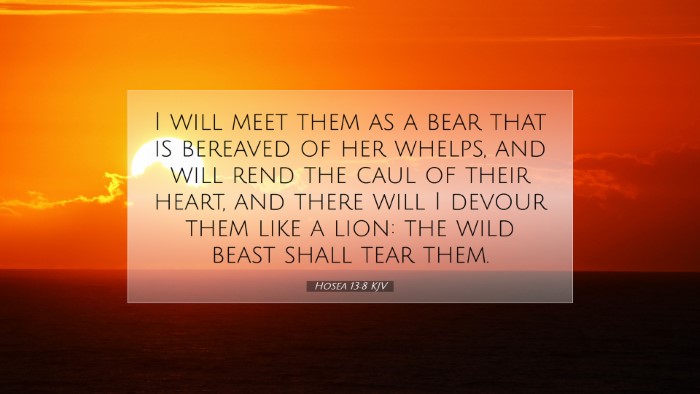Old Testament
Genesis Exodus Leviticus Numbers Deuteronomy Joshua Judges Ruth 1 Samuel 2 Samuel 1 Kings 2 Kings 1 Chronicles 2 Chronicles Ezra Nehemiah Esther Job Psalms Proverbs Ecclesiastes Song of Solomon Isaiah Jeremiah Lamentations Ezekiel Daniel Hosea Joel Amos Obadiah Jonah Micah Nahum Habakkuk Zephaniah Haggai Zechariah MalachiHosea 13:8
Hosea 13:8 KJV
I will meet them as a bear that is bereaved of her whelps, and will rend the caul of their heart, and there will I devour them like a lion: the wild beast shall tear them.
Hosea 13:8 Bible Commentary
Bible Commentary on Hosea 13:8
Verse: "I will meet them as a bear that is bereaved of her whelps, and will rend the caul of their heart; and there will I devour them like a lion: the wild beast shall tear them."
Introduction
The book of Hosea is a profound exploration of Israel's relationship with God, marked by themes of unfaithfulness and divine judgment. In Hosea 13:8, we are confronted with a striking metaphor that conveys God's fierce wrath toward a wayward nation. This commentary synthesizes insights from respected biblical scholars like Matthew Henry, Albert Barnes, and Adam Clarke to elucidate the theological implications of this verse.
The Metaphor of the Bereaved Bear
In this verse, God likens Himself to a bear robbed of her cubs. Matthew Henry interprets this imagery as depicting profound maternal instinct and grief, emphasizing the intensity of God's emotional state towards Israel’s unfaithfulness. A bereaved bear is driven by fierce and protective instincts, demonstrating how God's anger is prompted by betrayal and loss. He serves as a loving Father, yet His love is paired with an unswerving commitment to justice.
Albert Barnes reinforces this idea by explaining that the bear's rage comes from a deep sense of loss. When the Lord sees His people abandon Him for idols, it ignites a response that is both protective and punishing. Just as a bear would frantically seek to avenge her lost cubs, God’s judgment arises from His righteous indignation over Israel’s spiritual infidelity.
The Rend of the Heart
The phrase "will rend the caul of their heart" is particularly striking. Adam Clarke notes that this indicates a profound divine intervention aimed at tearing through the false security that the Israelites have built around their hearts. Clarke suggests that this act signifies the abrupt awakening of the Israelites to their dire condition—one that unveils their inner corruption and leads to a confrontation with the reality of their sins.
This ‘rending’ serves a dual purpose; it is both destructive and redemptive. It aims to strip away pretense and expose the utter depth of their need for repentance. The imagery of a heart being torn reflects the seriousness of their spiritual state, highlighting the painful yet necessary process of divine correction.
The Devouring Lion
The latter part of the verse draws on the imagery of a lion that devours, emphasizing the inevitability and severity of God's judgment. Matthew Henry comments that just as a lion is a formidable predator, so too is God in His ability to bring swift and unyielding judgment upon those who defy Him. The lion represents strength and ferocity, making clear that escape from God’s judgment is impossible without repentance.
Albert Barnes further contextualizes this imagery within the historical backdrop of Israel’s continual straying from God, suggesting that this devouring acts as a historical warning. The metaphor serves to remind the people of the destructive consequences of their actions. God's desire is not merely wrathful destruction but a call to return and restore the covenant relationship.
Reflection for Pastors and Students
This verse encourages deep reflection on the nature of divine judgment and mercy. For pastors and theologians, it serves as a reminder that while God's grace is generously offered, it exists in tension with His holiness. Adam Clarke reminds us that the purpose of such vivid imagery is not to drive believers into fear, but rather to evoke a sense of urgency regarding the need for repentance and reconciliation with God.
- Call to Action: Encourage congregations to self-examine and address areas of spiritual complacency.
- Understanding Judgment: Emphasize that God's judgment is a profound expression of His love, seeking the return of His wayward children.
- Promoting Repentance: Make space for confession and restoration in the church, understanding that God's desire is for reconciliation rather than condemnation.
Conclusion
Hosea 13:8 serves as a reminder that God’s emotions and actions are deeply tied to His relationship with humanity. The metaphors of the bereaved bear and the devouring lion compel us to recognize the seriousness of our spiritual condition and the urgency for return to our Creator. In exploring these rich texts, pastors, scholars, and students are invited to engage with God’s word on both an emotional and intellectual level, navigating the complexities of divine love, judgment, and the ever-present call to repentance.


